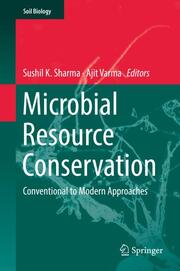Detailansicht
Microbial Resource Conservation
Conventional to Modern Approaches, Soil Biology 54
ISBN/EAN: 9783319969701
Umbreit-Nr.: 5269614
Sprache:
Englisch
Umfang: xiii, 451 S., 14 s/w Illustr., 44 farbige Illustr.
Format in cm:
Einband:
gebundenes Buch
Erschienen am 12.11.2018
Auflage: 1/2019
- Zusatztext
- This book covers broad areas in conservation of microorganisms. Short, medium and long-term preservation of agriculturally important microorganisms are covered. Culture collections and their roles are presented. The chapter covers topics such as conventional approach of bacterial, fungal and algal preservation, as well as methods and strategies for preservation of recalcitrant microorganisms. Readers will also discover latest insights into preservation of VA fungi and ecology, diversity and conservation of endophytes, and entamopathogenic fungi. Microbes of animal and dairy origin, their preservation and biosafety issues are explored. This book is the first of its kind which devotes completely on conservation of microorganisms and also on regulatory mechanisms of access and benefits sharing as per Biological Diversity (BD) Act 2002. It is a worthy read for research and industry. Microorganisms are 'silent and unseen majority of life' on the earth with high magnitude of genetic and metabolic diversity. It is well documented that no branch of science and society is untouched with microbial interventions. Researchers have documented microorganisms from the extreme and unique environments like cold desert, hot arid region, hydrothermal vents, saline area and are having specific traits that are being exploited in agriculture, industry, medicine and biotechnological applications. Such great potential are available only in microorganisms. The aim of this book is to spread knowledge of microbial wealth of the world and acquaint people about strategies and methodologies for conservation of microorganisms to save human life on this earth.
- Kurztext
- This book covers broad areas in conservation of microorganisms. Short, medium and long-term preservation of agriculturally important microorganisms are covered. Culture collections and their roles are presented. The chapter covers topics such as conventional approach of bacterial, fungal and algal preservation, as well as methods and strategies for preservation of recalcitrant microorganisms. Readers will also discover latest insights into preservation of VA fungi and ecology, diversity and conservation of endophytes, and entamopathogenic fungi. Microbes of animal and dairy origin, their preservation and biosafety issues are explored. This book is the first of its kind which devotes completely on conservation of microorganisms and also on regulatory mechanisms of access and benefits sharing as per Biological Diversity (BD) Act 2002. It is a worthy read for research and industry. Microorganisms are 'silent and unseen majority of life' on the earth with high magnitude of genetic and metabolic diversity. It is well documented that no branch of science and society is untouched with microbial interventions. Researchers have documented microorganisms from the extreme and unique environments like cold desert, hot arid region, hydrothermal vents, saline area and are having specific traits that are being exploited in agriculture, industry, medicine and biotechnological applications. Such great potential are available only in microorganisms. The aim of this book is to spread knowledge of microbial wealth of the world and acquaint people about strategies and methodologies for conservation of microorganisms to save human life on this earth.
- Autorenportrait
- Sushil K. Sharma is Principal Scientist (Agricultural Microbiology) and In-charge/Focal Point of National Agriculturally Important Microbial Culture Collection (NAIMCC) at ICAR-National Bureau of Agriculturally Important Microorganisms, MaunathBhanjan, Uttar Pradesh, India which is a designated repository (DR) recognized by National Biodiversity Authority, MoEF&CC, Govt of India. Dr Sharma is an individual member of World Federation for Culture Collections (WFCC). He is involved in coordination work of network project "Application of Microorganisms in Agriculture and Allied Sectors (AMAAS)" operating at different centers in India.His research interests include soil biology, microbiological basis of soil quality assessments,soil solarization and plant growth-promoting rhizobacteria. He is currently working on exploration, collection, characterization and conservation of microbial wealth of India. He is resource person for international, regional and national training/conference/workshops and delivered talk mainly on biofertilization and biofortification of soybean and wheat with Zn and Fe through microbial approaches, P- and Zn-solubilizing bacteria, and status and activities of microbial culture collections, and ex-situ conservation of microorganisms in NAIMCC. He is faculty member of Amity University, Noida for supervising Ph.D students. He is conducting training programs and group meeting for researchers, technical staff and farmers from all over the country on various aspects of microbiology. He has published more than 50 research articles, review articles, book chapters, and technical bulletins in his credit. Prof Dr Ajit Varma: Ajit Varma has completed his PhD at the age of 25 years from Allahabad University and Former Professor, School of Life Sciences, Jawaharlal Nehru University, India. Presently, he is the Distinguished Scientist & Professor of Eminence of Amity Institute of Microbial Technology; Pro-Vice Chancellor, Ritnand Balved Education Foundation, and Vice Chairman, Amity Science, Technology & Innovation Foundation Amity University Uttar Pradesh, India. He has published more than 314 papers. Ajit Varma is the Fellow of Alexander-von-Humboldt Society, Germany, elected Fellow of National Academy Agricultural Sciences and Fellow of Microbiology Society of India.
